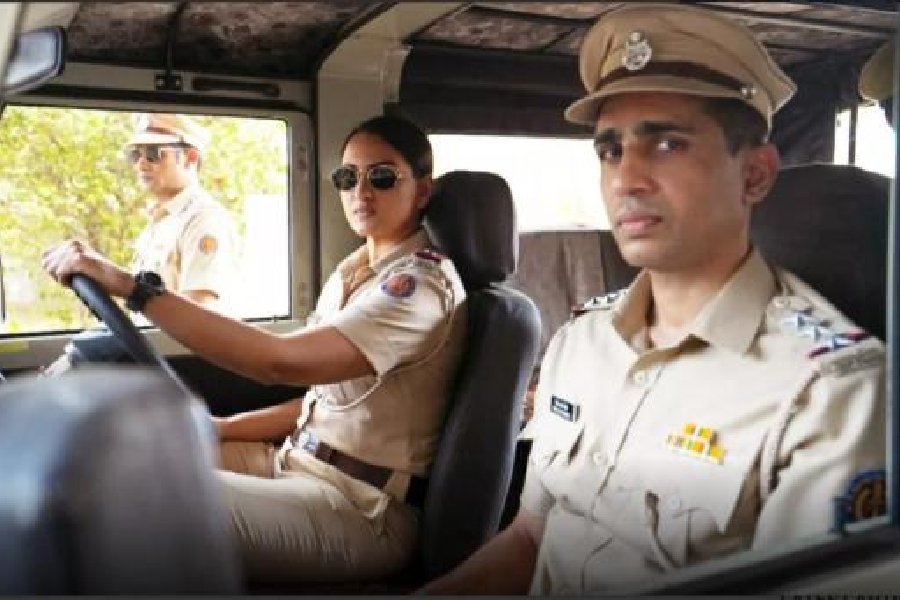Dahaad roars the loudest when quietest. The rest of it is a suppressed scream, with its rage, helplessness and frustration emanating not just from the dozens of innocent women who fall prey to a serial killer on the loose. It is also a shriek of protest against the social fabric that the series operates in.
Caste and crime are intrinsically intertwined in Dahaad. This slow-burn watch may wear the garb of a thriller — and yet not, because it isn’t really a whodunit — but is, in fact, a social commentary, touching upon caste discrimination, toxic parenting, emotional manipulation and, most significantly, the fact that women, in many parts of this country, are still considered the lowest common denominator, their value in both life and death reduced to less than nothing.
It is telling that Dahaad, now streaming on Prime Video, has been brought to life by women. Frequent collaborators Zoya Akhtar and Reema Kagti are its creators, with Reema and Ruchika Oberoi dividing up directorial duties. It is also significant that Dahaad is frontlined by a woman. Sonakshi Sinha, making her digital debut, plays Anjali Bhaati, a no-nonsense cop who not only has to shoulder the burden of being a woman in a man’s world, but also brace herself against the snide comments that accompany her belonging to a lower caste.
For this is Mandawa, a town in Rajasthan, where discrimination on the basis of gender, caste and more runs rife. But Anjali — whose father changed her surname to make life easier for his daughter — is no pushover. As a professional, she towers over her male colleagues; at home, she hits back at her mother’s daily chiding for not being married; in life, she’s a fighter, never backing down even when pushed against the wall.
It is a compelling character, played with a winning mix of controlled aggression and natural ease by Sonakshi. The accent may be inconsistent, but the body language and Sonakshi’s physicality aren’t, and in Anjali, Dahaad finds a heroine who you root for, but who, in reality, doesn’t need anyone to root for her.
It is Anjali who connects the missing dots when a number of women, gone missing for years, show a similar pattern of behaviour before they end up as murdered statistics. These women, whose families would rather see them dead than unmarried, are liabilities whose loss affects no one. Until Anjali decides to dig things up, unearthing these women from dusty police records and putting them on an evidence board, realising that a serial killer in the mould and with the modus operandi of the notorious Charles Sobhraj is on the loose.
Playing out over eight episodes, Dahaad sets up its world effectively. As mentioned earlier, the story reveals its villain at the outset, and then focuses on slowly revealing the anatomy of the criminal and his many crimes, offering an interesting psychological study into the mind of a man who kills with abandon.
It is said that a large number of serial killers, though lacking any evidence of empathy, guilt or remorse, have the ability to fit easily into the community, even carrying out the daily duties of a family man and social being. Dahaad’s antagonist is one such man, and watching him chillingly carry out his misdeeds even as he plays a game of cat-and-mouse with the cops — Anjali’s allies are her forward-thinking boss Devi Singh (the always dependable Gulshan Devaiah) and colleague Kailash Pargi (Sohum Shah impresses with the handling of his character’s arc) — will make you retch. But it will also raise an important question in your mind — this man may be the murderer, but aren’t also the families of his victims who push them to their fate?
In terms of setting, Rajasthan seems to be the new favourite, its topography and social structure making it fertile ground for the telling of hard-hitting stories. But while last week’s Saas Bahu Aur Flamingo imagined a utopian world where women run free and call the shots, the world sketched in Dahaad is closer to reality.
Dahaad isn’t an all-guns blazing good-vs-evil story. Things unfold at a leisurely pace, but that is what the intended DNA of the series is. The various threads take time to build and mesh with the larger narrative. While most of it coalesces well, there is also the fact that while telling a story over 500 minutes, give or take a few, gives a maker the freedom of detail, it also necessitates brevity. Parts of Dahaad play out longer than they should, mandating niftier work at the editing table.
The series also lacks nuance at times when it comes to illustrating the existing caste divide. For example, Bhaati’s high-class subordinate lighting a pair of incense sticks every time she passes his room, had made its point the first two times; it didn’t need repeated unsubtle underlining, thus reducing the impact of what it wants to say.
Despite its shortcomings, this is a series that demands to be watched, delivering as a police procedural, social commentary and an engaging character study. And if you are looking for just one reason to tune in to Dahaad this weekend, and stay with it through all its eight episodes, we have a name for you — Vijay Varma. Enough said.
I liked/ didn’t like Dahaad because... Tell t2@abp.in











